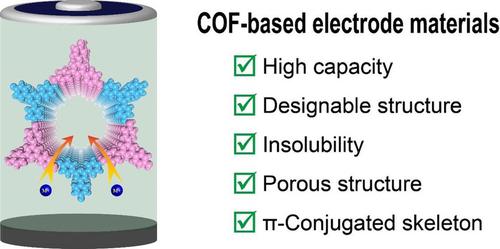当前位置:
X-MOL 学术
›
Chem. Rec.
›
论文详情
Our official English website, www.x-mol.net, welcomes your
feedback! (Note: you will need to create a separate account there.)
Covalent Organic Frameworks as Electrode Materials for Metal Ion Batteries: A Current Review.
The Chemical Record ( IF 7.0 ) Pub Date : 2020-09-03 , DOI: 10.1002/tcr.202000074 Zhaolei Wang 1 , Weize Jin 1 , Xiaoyu Huang 1, 2 , Guolin Lu 1 , Yongjun Li 1
The Chemical Record ( IF 7.0 ) Pub Date : 2020-09-03 , DOI: 10.1002/tcr.202000074 Zhaolei Wang 1 , Weize Jin 1 , Xiaoyu Huang 1, 2 , Guolin Lu 1 , Yongjun Li 1
Affiliation

|
As the world moves toward electromobility, our daily lives are flooded with variety of lithium ion batteries (LIBs), and the concerns of cost, safety and environmental friendliness of LIBs spring up in the minds of scientists. Although organic electrodes have been considered as promising alternatives to their inorganic counterparts, some intrinsic weaknesses still plague scientists, such as high solubility, low conductivity and sluggish ion diffusion. The emergence of covalent organic frameworks (COFs) attracts our attention because of their robust networks and open pores that could facilitate the infiltration of electrolyte ions when used as electrodes for metal‐ion batteries (MIBs). In this review, we summarized the recent progress of COFs as electrode materials, and the strategies toward enhancing electrochemical performance of COF‐based electrode in MIBs are discussed. Hopefully, this review will provide a fundamental guidance for future development of COF‐based electrodes.
中文翻译:

共价有机框架作为金属离子电池的电极材料:最新评论。
随着世界向电动汽车发展,我们的日常生活中充斥着各种各样的锂离子电池(LIB),科学家们想到了对LIB的成本,安全性和环境友好性的关注。尽管有机电极已被认为是替代无机电极的有前途的替代方法,但一些固有的弱点仍然困扰着科学家,例如高溶解度,低电导率和缓慢的离子扩散。共价有机骨架(COF)的出现吸引了我们的注意力,因为它们坚固的网络和开孔可在用作金属离子电池(MIB)的电极时促进电解质离子的渗透。在这篇综述中,我们总结了COF作为电极材料的最新进展,并讨论了提高MIB中COF基电极的电化学性能的策略。希望这项审查将为基于COF的电极的未来发展提供基本指导。
更新日期:2020-10-17
中文翻译:

共价有机框架作为金属离子电池的电极材料:最新评论。
随着世界向电动汽车发展,我们的日常生活中充斥着各种各样的锂离子电池(LIB),科学家们想到了对LIB的成本,安全性和环境友好性的关注。尽管有机电极已被认为是替代无机电极的有前途的替代方法,但一些固有的弱点仍然困扰着科学家,例如高溶解度,低电导率和缓慢的离子扩散。共价有机骨架(COF)的出现吸引了我们的注意力,因为它们坚固的网络和开孔可在用作金属离子电池(MIB)的电极时促进电解质离子的渗透。在这篇综述中,我们总结了COF作为电极材料的最新进展,并讨论了提高MIB中COF基电极的电化学性能的策略。希望这项审查将为基于COF的电极的未来发展提供基本指导。











































 京公网安备 11010802027423号
京公网安备 11010802027423号